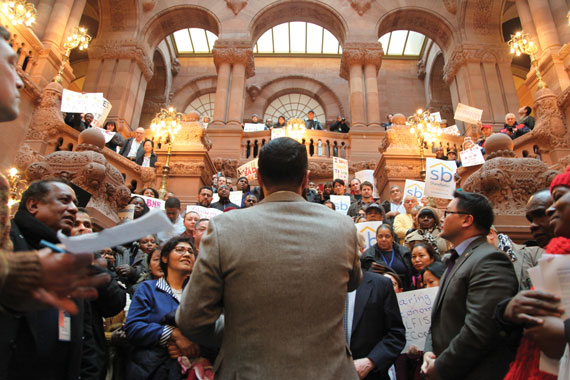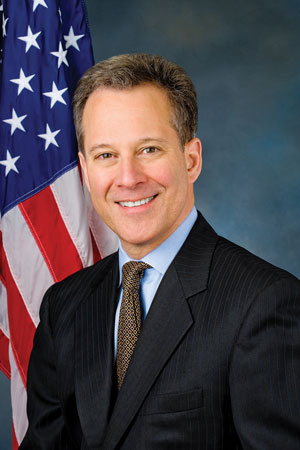
From left: Airbnb co-founders Joe Gebbia, Nathan Blecharczyk and Brian Chesky (Photo by: Danielle Levitt/August)
If there was ever a clear sign that things had gotten ugly for Airbnb in New York, it might have been last October, during a City Council hearing on a proposal to raise fines against illegal hotel operators. What began as a quarrel over the vagaries of the law devolved into a nasty political exchange over Airbnb’s role in the local economy and what it means to share New York City’s most prized commodity — real estate.
“You are a deceiver,” Council Member Jumaane Williams said to Christopher Lehane, Airbnb’s high-powered head of global policy and public affairs. “How dare you come here and ask us if we are trying to protect the middle class or not, when your deception is what’s causing the middle-class to suffer even more because you’re taking housing off of the market.”
Lehane, a veteran political strategist and crisis communications expert who helped manage the Monica Lewinsky scandal for President Clinton, returned the fire.
“Watching you,” he told Williams, “is like watching an attack on the middle class.”
As its popularity and valuation soars, Airbnb is inspiring deep vitriol here in New York. The 8-year-old San Francisco-based startup has been accused of everything from siphoning millions of dollars away from the hotel industry to infringing on the quality of life in buildings to exacerbating the affordable housing crisis.
While the company been met with opposition around the globe, it has faced a particularly tough battle in its biggest U.S. market, where in 2010, a state law made it illegal for New York apartment dwellers to rent out their homes for fewer than 30 days — unless they are home.
Despite spending roughly $800,000 over the past six years lobbying in Albany and at City Hall, Airbnb hasn’t made any legislative inroads. According to several estimates, more than half of its New York City listings are illegal.

Christopher Lehane
Not surprisingly, a crackdown has ensued. In November, Mayor Bill de Blasio pledged $10 million over the next three years to go after individuals violating short-term rental laws. That’s in addition to three proposals floating in the City Council that could curb Airbnb rentals. The most damaging of those would raise maximum fines on illegal hotels from $25,000 to $50,000, although it’s unclear still whether those fines would apply to hosts or landlords.
“We’re trying to find a way to make sure Airbnb feels the hit,” said City Council Member Helen Rosenthal, the Upper West Side Democrat who introduced the bill. “The most important message for me to get out there is that we are going to make life as difficult as possible for Airbnb, who continues to just ignore state law.”
In the face of seemingly unrelenting opposition, Airbnb, which has been at the forefront of the sharing economy, is showing no signs of giving up ground. Instead, the company seems to be gearing up for what might be its biggest fight yet.
While many believe the political deck is stacked against Airbnb in the Big Apple, sources say the company cannot be counted out. For starters, it’s flush with cash. In December, it completed a $1.5 billion fundraising round that valued it at a massive $25.5 billion. And if its actions in other cities are any indication, it’s certainly capable of mounting an intense political fight. In San Francisco, for example, it defeated a ballot measure in November that would have saddled Airbnb users with additional restrictions and exposed them legally. The startup raised more than $8 million to fight the measure.
The victory surprised the political establishment, signaling to lawmakers here that the company should not be underestimated.
And within just the last year, Airbnb has assembled a national team of more than a dozen seasoned political strategists, including Lehane, and has significantly beefed up its New York ground game.
“New York City is the center of the hotel-industrial complex,” Lehane told The Real Deal last month. “A lot of hotels are based in New York, and obviously they have made it pretty clear where they stand on the issue. But this is not even a sprint or a marathon; it’s a triathlon.”

Assemblyman Francisco Moya talking to a crowd at an Airbnb protest in the state capitol building.
Political offensive
In New York, Airbnb is focusing on establishing a grassroots strategy that resembles a political campaign. In October, it hired Josh Meltzer, the former deputy chief of staff to Attorney General Eric Schneiderman, one of its harshest critics.
Meltzer, who was brought on as public policy director, has been spearheading the company’s effort to get favorable laws passed on the state level.
The sheer number of Airbnb users gives it political clout, according to Meltzer.
“In New York, there are 321,000 Airbnb users — including more than 40,000 active hosts — who are looking to their elected officials to pass sensible home sharing laws,” he wrote in an email.
One of the company’s big initiatives is to mobilize those hosts to become public advocates for home sharing, which was an integral component of the company’s success in San Francisco, Lehane told TRD.
Known as “home-sharing clubs,” the members are expected to reach out to their community organizations, canvass their neighborhoods to shore up support for Airbnb and act as boosters for the company on social media sites such as Instagram and Twitter.
In San Francisco, the company mobilized about 7,000 hosts and small businesses. “We’re looking to replicate what we did in San Francisco, where we took it to a whole new level,” Lehane said.

San Francisco
With a host community more than six times larger than that of San Francisco, Lehane said he expects a strong response in New York City that will serve as a counterbalance to the company’s vocal critics. He said the home-sharing clubs will reach out to lawmakers directly as well as conduct ad-hoc social media campaigns in an effort to turn the political tides.
“What’s clear is that this is a very activist-oriented community,” he said. “By their very DNA they like to engage in the process.”
In November, Airbnb released a “Community Compact,” a document in which it pledged to crack down on illegal hotel use, ensure hosts pay taxes and share data with local governments.
Another part of its political action plan is to conduct a “surround-sound” strategy in which Airbnb picks up victories in nearby municipalities before taking on bigger fights. In Jersey City, for example, Airbnb scored a big win in the fall when lawmakers legalized short-term rentals and imposed hotel taxes on them.
As part of its new push in New York, the company has also ramped up its lobbying efforts.
All told, Airbnb paid $337,500 to lobbyists last year – double what it spent in 2014.
In 2014, it brought on high-profile lobbying and consulting firm Capalino and Company to sway city lawmakers. And late last year the company beefed up its upstate presence when it hired another top Albany lobbying shop, Brown & Weinraub, whose partners were senior advisors to Governor Mario Cuomo.
All the same, the company’s attempt to court politicians is not new.
Since 2010, it’s employed lobbying firm Bolton St. Johns — a jack-of-all trades shop that has represented tech companies like Google and Lyft. And during the 2013 mayoral campaign, the three Airbnb founders each donated the maximum sum of $4,950 to Bill de Blasio.
On the public relations front, the company has poured tens of millions of dollars in advertising and publicity campaigns in the last few years, according to news reports. In 2014, it sponsored the NYC Marathon and blanketed the city with advertisements and commercials featuring middle-class New Yorkers talking about how home-sharing helps them make ends meet.
The ads featured New Yorkers like Lisa H., an Airbnb host who lives in Fort Greene, Brooklyn. Lisa, who asked that her last name not be used, told TRD, “An extra $8,000 a year, give or take, really makes a difference. I have a budget where I can cover my expenses.”
‘The bigger we get’
To understand where Airbnb is now, it helps to go back in time.
In 2007, company co-founders Brian Chesky and Joe Gebbia, then recent art school grads, were living in San Francisco and struggling to pay their rent. When a large design conference came into town and the city’s 35,000 hotel rooms quickly booked up, the two hatched an idea to rent out an inflatable mattress. They turned to Gebbia’s former roommate, Nathan Blecharczyk, a programmer, to develop a website. From that, Airbedandbreakfast.com was born. Today, the company — which changed its name to Airbnb in 2009 — has 2 million listings in 34,000 cities and 191 countries worldwide. New York City, with roughly 40,000 Airbnb listings, is neck and neck with London as Airbnb’s second-most popular city in the world, trailing only behind Paris, which has more than 66,000 listings, according to the company.
But with size and market share comes scrutiny.
“The bigger we get, we know the more attention we draw from regulators,” Chesky said on Bloomberg TV in October. “But I also think the bigger we get the more regulators say, ‘Airbnb are partners to us.’ To regulate Airbnb is to recognize Airbnb.”
That is, perhaps, why there are a number of major stakeholders furiously trying to prevent Airbnb from winning legitimacy.
In New York, as in other cities, the hotel industry has emerged as one of Airbnb’s biggest enemies.
In 2014, Metropolitan Public Strategies, a New York-based public relations and consulting firm, launched an anti-Airbnb PR campaign on behalf of a diverse coalition that includes two particularly powerful special-interest groups: the Hotel Association of New York, which represents 270 hotels in the city, and the New York Hotel Trades Council, the 32,000-member hospitality workers’ union headed by influential labor leader Peter Ward.
The two organizations last year shelled out roughly $457,000 on lobbyists and have cited Airbnb as one of their top priorities. In addition, the Hotel Trades Council and its political action committee doled out nearly $400,000 in political contributions in 2015, making donations to top lawmakers including Schneiderman, Assembly Speaker Carl Heastie, state Senator Jeff Klein, as well as the aforementioned City Council member Williams.
Political strategist Hank Sheinkopf said the Hotel Trades Council has a very politically active membership. “What makes them powerful is the ability to mobilize their members, many of whom are Latino and live in the outer boroughs,” he said. “These battles are won more by troops and less by media [campaigns].”

Eric T. Schneiderman
Compared to the Hotel Trades Council, the Hotel Association has shelled out far less in campaign donations — roughly $7,000 in New York last year— but the group did give $25,000 last year to an organization supporting the San Francisco referendum. The group has also reportedly taken its case directly to Mayor Bill de Blasio and lawmakers behind the scenes.
“The union and the hotel association are powerful enemies,” said political operative George Arzt, a consultant and spokesperson who has worked in and around New York City government for 40 years. “[Airbnb] needs to diffuse the opposition and show they’re not taking away hotel rooms.”
That might be a tall order for the company.
According to AirDNA, an independent website that tracks Airbnb, hosts in New York City raked in $420 million during the 12-month period ending July 31 last year.
Another study prepared by HVS Consulting & Valuation in October for the Hotel Association found that Airbnb racked up $451.4 million in revenue in New York City last year, a figure that was characterized as a “direct loss” to the hotel industry. That number, according to the report, is expected to rise steadily for the next few years and hit $805 million in 2018.
In December, the city’s Independent Budget Office said competition from the website — along with the rising dollar and increased hotel supply — was partly to blame for a $14 million drop in hotel occupancy taxes for the city. And last month, a report from global commercial brokerage CBRE found the New York hotel market to be the most at risk in the U.S. to competition from Airbnb due to factors such as the company’s market share and its competitive rates. While the CBRE report said that Airbnb units make up nearly 20 percent of all New York City hotel inventory, other tallies pegged Airbnb’s true market share — based on listings that are comparable to hotel rooms — at a much lower 5 percent.
Morris Moinian, president of the hospitality firm Fortuna Realty Group, said Airbnb’s impact is felt most acutely by two- and three-star hotels, particularly when demand in the city is low.
“It doesn’t really affect the luxury stuff, but [on lower-priced inventory] it has a huge impact,” said Moinian. “The fact is, it’s an illegal business, and it’s up to the politicians to do something about it.”
In 2014, Schneiderman — who notably received more than $100,000 in campaign contributions from hotel and hospitality labor executives — released a scathing report on Airbnb, which concluded that 72 percent of Airbnb’s listings violated the law. A Schneiderman spokesman has said the report was not influenced by the hotel industry, noting that the AG’s Airbnb investigation began in mid-2013.
However, the CBRE study also found that Airbnb’s revenue growth in New York was one of the slowest of any big U.S. city in 2015 — a fact that it attributed to either a “maturing market” or “the New York Attorney General’s increased scrutiny.” Its revenue in New York City was up 45 percent, compared to 64 percent in San Diego and 65 percent in Los Angeles.
Not helping matters for the company is a softening in Manhattan’s $8 billion hotel industry. Last year was the first time since 2010 that the sector saw key metrics, such as the average daily room rate and the revenue per available room, drop.
Airbnb and its users, the hotel industry argues, have an unfair leg up because they don’t have to adhere to safety regulations or deal with higher operational costs.
“It’s enormously disproportionate,” said Vijay Dandapani, president of Apple Core Hotels and a board member at the Hotel Association of New York. “There are a range of economic advantages, asymmetries that give them the ability to price lower in a major city.”
In addition, New York City has a hotel occupancy tax of roughly 5.9 percent. Airbnb hosts are responsible for paying it, but few do so.
Schneiderman’s Airbnb report, in fact, found that the city was owed some $33 million in hotel taxes from 2011 to mid-2014.
While Airbnb collects taxes in a handful of U.S. cities on behalf of its hosts, it has been unclear if the company can do so in New York. Some say nothing’s stopping the company from collecting the tariffs; others say state laws prohibit it from doing so. Nonetheless, the company and its allies are looking for affirmative legislation that would — if nothing else — state clearly and loudly that Airbnb is a legit operator.
Last April, the company wrote to the state legislature asking members to take action, but so far has had no luck. Opponents argue that since much of Airbnb’s business is illegal, the government shouldn’t legitimize the activity by letting the company collect taxes.
For its part, Airbnb estimates it could generate $65 million a year in hotel taxes statewide if it were legalized. The push to collect taxes has drawn support from at least a few legislators, including State Senator Phil Boyle, a Long Island Republican, who is in the early stages of working on a bill that would indisputably allow Airbnb to collect hotel taxes.
“I think that most people understand that this is the way of the future, and anything we do to try and stop it is just going to slow down an area of the economy that has a chance to be positive for the state of New York,” he said.
The sharing economy meets NYC landlords
On the surface, Airbnb’s business seems straightforward: Give people a way to share their homes and earn a little extra income. But that can be tricky in a city where more than 1 million apartments — or nearly half of the rental inventory — are under some form of rent regulation.
Last year, Related Companies tried to evict a rent-stabilized tenant from its MiMa apartment tower in Hell’s Kitchen after discovering he had listed the two-bedroom for $649 per night. Henry Ikezi paid $6,670 a month for the unit, which had a market rent of over $9,000 a month.
This past December, a state appeals court upheld a housing judge’s decision to evict Ikezi, concluding that tenants have no right to profit from apartments with rent restrictions.
The verdict was seen as a win for all rent-regulated landlords, but especially Related, which has aggressively tried to crack down on illegal Airbnb listings in its buildings.
“Related is committed to ensuring that all our residential units comply with the rent-stabilization laws, and we have a zero-tolerance policy in that regard,” a company spokesperson said.
In fact, the company even developed a PowerPoint slide presentation to teach property managers how to sniff out tenants listing their units on Airbnb.
Sherwin Belkin, an attorney who represents rent-regulated landlords, said property owners, not their renters, should be able to control who comes in and out of their buildings.
“I keep hearing this phrase ‘the sharing economy.’ [What’s] being forgotten is that what Airbnb and other short-term rental groups are sharing is not their property,” said Sherwin Belkin, an attorney who represents rent-regulated landlords.
“It poses a significant problem in that when violations are posted, it’s the landlord that often gets fined, even though the landlord is not at fault,” he said.
But while Airbnb has proven to be a nuisance and legal liability for large property owners, some Airbnb hosts have found the site to be a source of a steady income.
Schneiderman found that top NYC Airbnb users had created a multi-million-dollar business by renting out multiple apartments as illegal hotels. Moreover, the AG concluded that the use of Airbnb was displacing long-term housing.
That is one of the startup’s biggest hurdles when it comes to swaying lawmakers to its side. “I don’t know if there’s any messenger, no matter how talented or credible, that’s going to convince them that what they’re seeing with their own eyes isn’t the reality,” Micah Lasher, Schneiderman’s chief of staff, told TRD.
In hopes of cutting a deal, Airbnb has reached out to large rental property owners. In December, the Wall Street Journal reported that landlords Equity Residential, AvalonBay Communities and Camden Property Trust were in discussions with Airbnb about coming up with a revenue-sharing model that would provide the home-sharing website with greater access while giving landlords a piece of the pie. The arrangement would mark a major compromise between Airbnb and property owners.
But on Equity Residential’s earnings call last month, CEO David Neithercut said any potential deal was on the bottom of the priority list, and the talks were “more about gaining transparency and control around all that’s going on around us.”
There is, however, precedent for cooperation in the sharing industry. The five-year-old co-working startup WeWork has succeeded largely by working with commercial landlords, rather than against them. And in January, Paavo Monkkonen and Nate Holmes — at the University of California, Los Angeles — raised a start-up comparison when it penned an op-ed in the Urban Land Institute’s magazine headlined “Will Airbnb Go the Way of Napster?”
The duo noted that during the early aughts, the online file-sharing platform Napster went up against the powerful music industry and lost. A few years after Napster shuttered, Steve Jobs’ Apple came along with iTunes and succeeded by making nice with music execs. “As it contemplates different relationships with cities, Airbnb would be wise to heed the example of Apple’s success working with established stakeholders,” the authors said. “Otherwise, the upstart company may find itself known as the Napster of the short-term rental market.”
The bottom line
Ultimately, however, despite all of the controversy, Airbnb’s success might boil down to how much it contributes to the local economy. That metric might prove to be its biggest political weapon yet.
The company has said it generated $632 million in economic activity in New York City in 2012. Of that sum, $104 million came from outside of Manhattan. (Airbnb says that 82 percent of its New York listings are outside the main tourist area of Midtown — a statistic perhaps designed to illustrate that it’s not competing with Manhattan hotels.) But, as recently as last month, Airbnb admitted to purging more than 1,000 controversial listings from its site just before publicly releasing data last year, a scandal that was uncovered by the watchdog-blog Inside Airbnb.
Kathryn Wylde, president of the pro-business group Partnership for New York City, said Airbnb is in a tough spot because it needs to get legislation passed. That, she said, is a much harder lift than preventing legislation from getting approved.
Wylde, whose organization counts the real estate and hotel industry among its members, acknowledges that more safeguards are needed to regulate Airbnb.
Still, she said, Airbnb has backing from her organization. “We certainly don’t countenance the abuses, and we’re not endorsing Airbnb on all terms,” she said. “But we think there is room to be able to work out an arrangement where everybody wins.”
Correction: A previous version of this story incorrectly identified the lobbying firm Bolton St. John’s past real estate clients.
